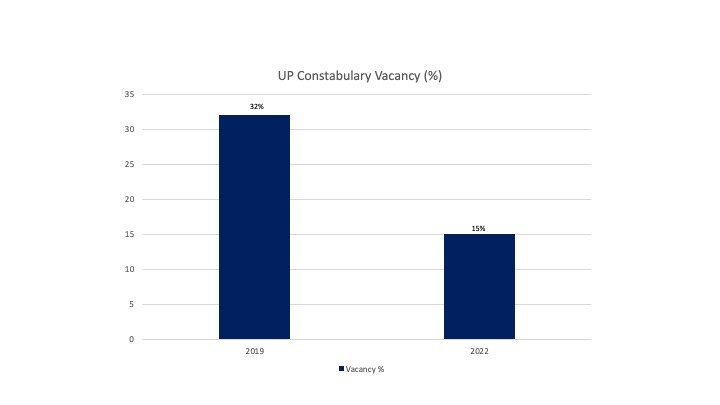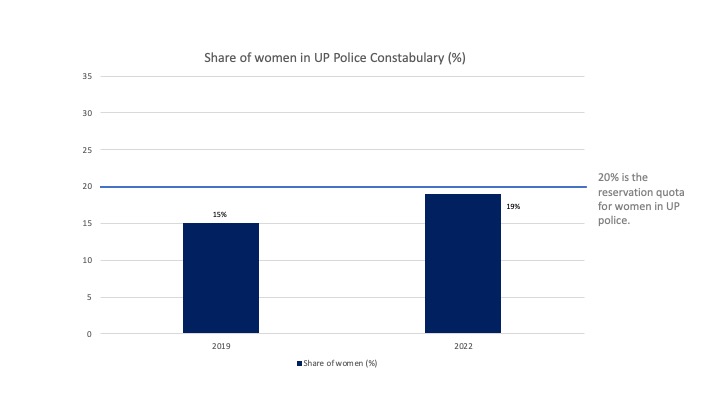Police recruitments and the need for reform
While UP untangles its police recruitment challenges in the face of a shortfall in constables, the state should also use this moment to retrain its police
In recent years, the process of police recruitment has faced growing criticism for being subjective, corrupt, and susceptible to various outside influences. The most recent example is the cancellation of Uttar Pradesh’s police constable examination after reports of paper leaks and malpractice surfaced in mid-February. The paper was allegedly leaked on WhatsApp just hours before the exam. In response, the government has initiated a probe by a Special Task Force and announced plans to reconduct the exam within six months.

On December 23, 2023, the Uttar Pradesh Police Recruitment Board released a notification for the recruitment of 60,244 police constables. Conducted in four shifts over two days in 2,400 centres across all 75 districts, this recruitment drive was to be the largest ever. A total of 48 lakh people applied and 43 lakh – over 700 times the number of posts to be filled – appeared for the examination.
Typically, recruitment cycles are lengthy and take two or three years from start to finish. The process begins with the decision to fill a number of vacancies that have accumulated over years followed by a decision on the timing for announcing the call for applications. Then comes the screening process, where eligibility criteria such as age and educational qualification are applied. Shortlisted candidates must then sit for a written examination and pass physical standard and endurance tests. Once these hurdles are cleared, documents are verified and adjustments may be made to ensure compliance with requisite caste and gender quotas. Finally, selected candidates are notified and then have to undergo training, marking the culmination of the extensive recruitment process.

The last notification for recruitment for 49,500 civil and armed police positions in UP was released in 2018. The final result was declared nearly two years later, in March 2020, stretching the entire process over 17 months. Despite these recruitment efforts, there was still a vacancy of 14.7% in UP police constable posts, as of January 2022. UP’s police constable recruitment announcement in December 2023 thus put an end to a four-year-long wait for hopefuls.
UP has 133.86 police personnel per lakh population, per 2022 data. This is below the national average of 152.80 and short of its own sanctioned strength of 181.75. Despite having the highest sanctioned and actual strength of civil police in the country, the state continues to grapple with a high number of vacancies, totalling over 70,391. With a vacancy of 21.6%, the existing total civil police strength (constabulary + officer ranks) falls significantly short of the sanctioned strength of 3,23,830.
Buried under these figures is the shortfall in women's police personnel. Uttar Pradesh has only 29,328 women at police constable rank, as of January 2022. This represents 18.59% of the total state constable strength. These numbers fall short of the state’s own goal of reserving 20% of positions for women and are also significantly lower than the ministry of home affairs’ target of increasing women’s representation in the police force to 33%.
Governments have accepted diversity in the police force, both by policy and mandate. However, UP hasn’t met the statutory reserved quota for Scheduled Castes (SC) and Scheduled Tribes (ST) in the police force. The share of SCs stands at 18.7% and STs at 1.26%, respectively, against the reservation quotas of 21% and 2%.
Prolonged gaps in police recruitment worsen yearly shortfalls, while sudden large intakes strain already inadequate training infrastructures. Disproportionate recruitments – or an imbalance between the number of officer and constable recruits – can also affect the maintenance of the teeth-to-tail ratio between officers and constabulary. The Padmanabhaiah Committee on Police Reforms recommends a ratio of 1 officer to 4 constables, but in UP, it currently stands at 1:6.

The challenges in police recruitment extend beyond UP. In states like Karnataka, Sub-Inspector recruitment has been stalled due to misconduct allegations and court challenges. In 2023, in Bihar, the Central Selection Board of Constables cancelled the examination due to a cheating scandal. The prevalence of recruitment scams and irregularities underscores the need for fundamental systemic reform. Despite investigations and disciplinary actions against defaulters, significant changes that will ensure that recruitment is wholly objective and based solely on merit have proved elusive.
While UP untangles its recruitment challenges, it will remain short of more than 27,000 police constables. Increasing numbers is one step in the quest for ensuring the public’s safety and security - and incidentally easing unemployment within the huge cohort of unemployed youth in the state. However, simply having ‘more’ police is not enough to yield meaningful improvement in the overall quality of policing if crucial aspects like training, internal oversight, external accountability, and operational responsibility remain unchanged. These are essential for a more secure and trustworthy future. The inequalities of ratio in both gender and caste in the police force illustrate inadequate diversity and inclusive policing. UP needs boots on the ground, but it also needs to pick this moment to review how well it uses the human resources it does have and retrain and reorient its police to provide its public with a rule-of-law police service, rather than merely a heavier force.
Nidha Parveen is a research associate at the India Justice Report. The views expressed are personal.
All Access.
One Subscription.
Get 360° coverage—from daily headlines
to 100 year archives.



HT App & Website







